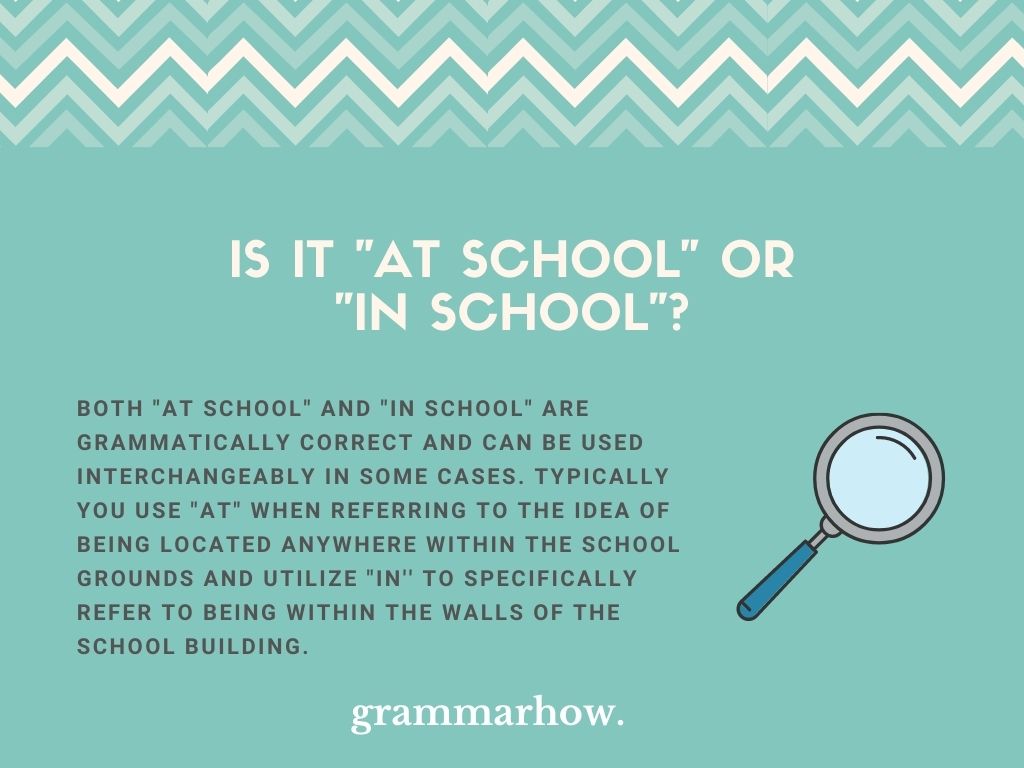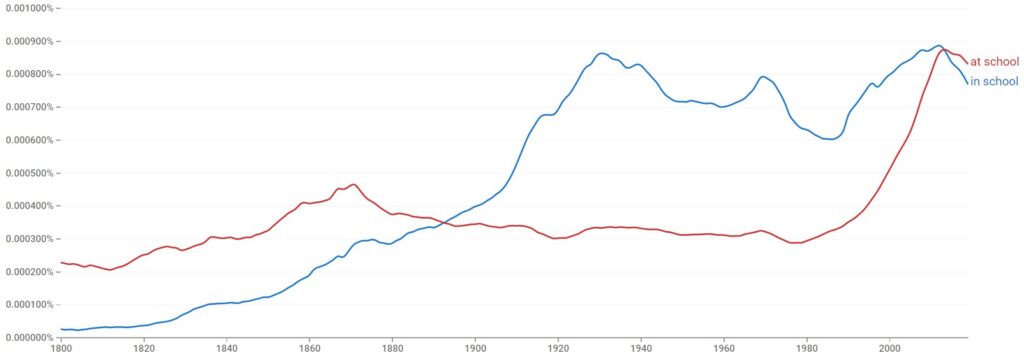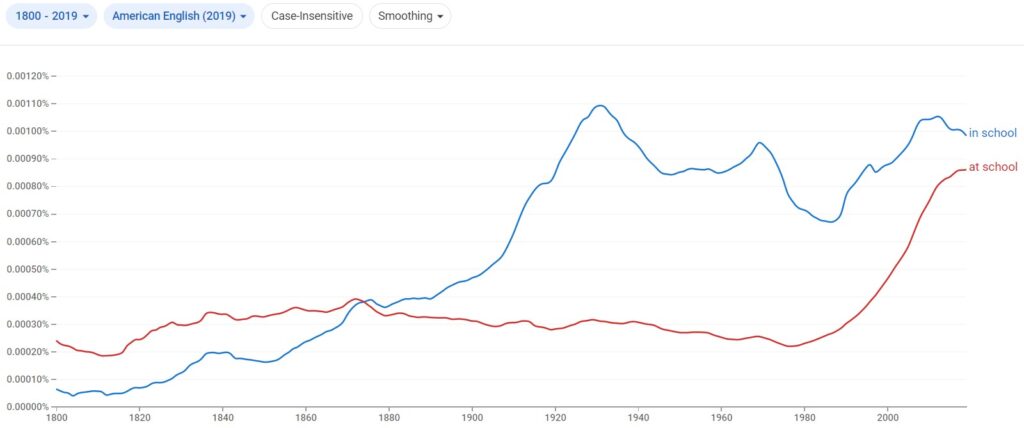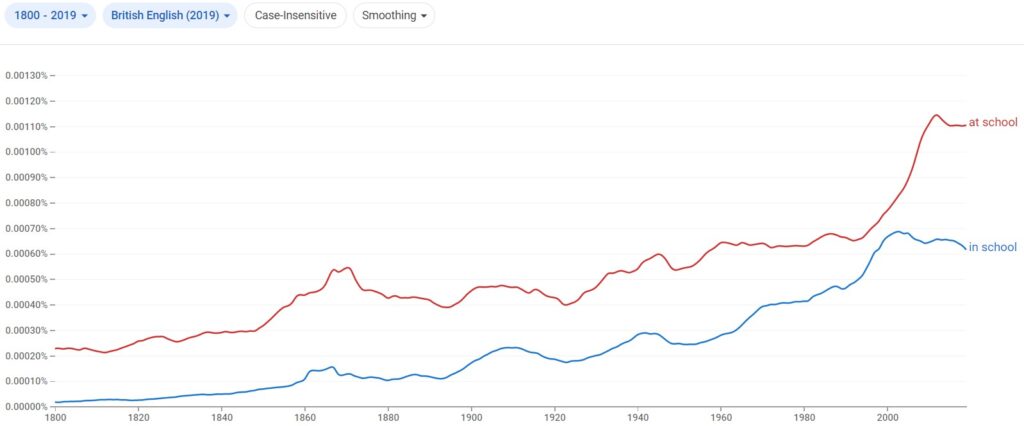You’ve most likely heard both of the expressions “at school” and “in school” used at some point in everyday conversation, but have you stopped to think about whether or not they are interchangeable? Read below to discover the proper context to use each.
Is It “At School” Or “In School”?
Both “at school” and “in school” are grammatically correct and can be used interchangeably in some cases. Typically you use “at” when referring to the idea of being located anywhere within the school grounds and utilize “in” to specifically refer to being within the walls of the school building.

You can see how this distinction makes sense when you look at the examples for using “at’ or “in” to refer to a place.
Use “at” to show:
- A meeting place or location
- The edge of something
- The corner of something
- A target
Use “in” to show:
- An enclosed space
- A geographical location
Despite these suggestions, you will often see these two phrases used interchangeably.
When Should I Use “At School”?
Use the phrase “at school” to indicate that a person is currently anywhere within the designated “grounds” of the school or in a general sense are attending (or have attended) the educational institution to which you are referring.
Here are some examples:
- We are at school today because it is not a nationally recognized holiday.
- The children are at school from 7:00 AM until 3:00 PM every weekday.
- The dance this weekend is at school, but I’m not sure where in the building they are holding it.
- When I was at school as a child, I often counted down the minutes until the day was over.
Notice how the 1st, 2nd, and 3rd examples do not specify an exact location within the school (i.e., in the classroom, in the library, etc.) and the 4th example is a general reference to an individual having attended school at some point in the past.
When Should I Use “In School”?
Use the phrase “in school” to imply that the person is within the actual school building (as opposed to just being somewhere on the school grounds) or in a general sense are attending (or have attended) the educational institution to which you are referring.
See the examples shown here:
- Jeremy is in school right now so he can’t come with me to the store to pick out new shoes.
- Are your children at the ages now where they are in school?
- The children are in school every Monday, Wednesday, and Friday, but we homeschool them on Tuesdays and Thursdays.
- When I was in school I often got into trouble for talking when I wasn’t supposed to talk.
In these examples, the 1st sentence describes Jeremy as actually being within the school building, whereas the 2nd, 3rd, and 4th examples are more general and refer to attendance or enrollment at a school.
Is “At School” Or “In School” Used The Most?
Both the phrases “at school” and “in school” have been used the most at various times throughout history, often overlapping each other or alternating in popularity, showing that they are used interchangeably in meaning.
The Google Ngram Viewer here is interesting to look at because it shows that for most of the 1800s, the phrase “at school” was more popular than “in school.”

However, around 1892, the two phrases became equally as frequent in use, and by 1893 “in school” had surpassed “at school” as the more popular option.
From that point, “in school” has held steady as the more utilized phrase up until about 2012, when “at school” caught up to it and the two phrases were once again equal.
From 2012 until today, it appears that “at school” is once again becoming the more popular option, although “in school” is not close behind.
Are “At School” And “In School” Used Differently In The US And The UK?
Overall in the English language, “in school” is utilized more frequently in American English, and “at school” is more popular in British English.
According to this Google Ngram Viewer for American English, although early in the 1800s, the preferred version was “at school,” the phrase “in school” quickly overtook it starting when they overlapped in about 1872.

After 1872, the phrase “in school” was much more frequently used in American English than “at school.” This historical change would make sense given that the British had colonized America, so the influence in the language would be apparent.
When we look at the Google Ngram Viewer for British English we see that the two phases maintained a consistent separation in popularity throughout history, even though the usage of both of them continued to rise.

When Should I Use “On School”?
You can only use the phrase “on school” in a grammatically correct way if the word “school” is immediately followed by a noun. In this case, the word “school” would be acting in the place of an adjective, even though it is not technically an adjective.
Occasionally in the English Language, words can “pretend” in a way, that they are another part of speech, depending on how they are used within a particular sentence. In this case, the word “school,” although ordinarily a noun or a verb, can act as though it is an adjective and describe the noun that comes immediately after it.
Use these examples to better clarify:
- We are not allowed to smoke while on school grounds.
- They are going to be having a meeting on school policy within the next several days.
- On school days we wake up much earlier than we do on the weekends.
Note how in these examples the word “school” describes the noun that immediately follows it – “school grounds,” “school policy,” and “school days” – so it acts more like an adjective even though it is technically still a noun.
Quiz: Have You Mastered Prepositions For “School”?
Let’s check your knowledge! Do you now have a good understanding of how to properly use the prepositions “at,” “in,” and “on” in conjunction with the word “school.”
You can find the answers to the questions underneath the next heading.
- Since the incident happened (A. at/ B. on/ C. in) school property, he was suspended for 10 days.
- We’ve been (A. at/ B. on/ C. in) school for 100 days so far and it feels like we just started.
- I left my coat (A. at/ B. on/ C. in) school on Monday and now I can’t find it at all.
- The teacher says that I can’t use my phone when I’m (A. at/ B. on/ C. in) school so I have to keep it in my backpack.
- The soccer game is (A. at/ B. on/ C. in) school next Friday night, I hope you can make it.
Quiz Answers
- B
- C
- A
- A or C
- A
You may also like:
“In College” Or “At College” – Easy Preposition Guide
